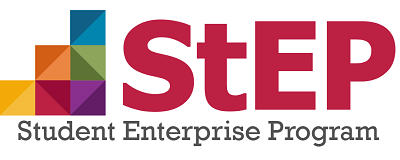
StEP REQUIREMENTS
- Businesses must be owned and operated exclusively by current Washington University undergraduate students.
- Business may not sell a product or service that directly competes with the University or any existing contract between the University and an outside contractor.
- All business owners must sign a StEP Statement of Responsibility.
- All businesses must carry and provide proof of business liability insurance.
- Businesses operating from one of the Gregg House storefronts must sign a lease agreement and pay monthly rent.
- All StEP businesses must sign a franchise agreement.
- Student entrepreneurs and their associates must conduct business in a professional manner.
- Business owners must submit an annual report detailing operations and proof of ownership/sales annually.
- Businesses must complete an annual renewal process and receive approval from the advisory board to continue operations.
StEP Guiding Principles
The Student Enterprise Program (StEP) provides participants an educational, hands-on entrepreneurial business experience for undergraduate students at Washington University in St. Louis. The program is overseen by the Skandalaris Center for Interdisciplinary Innovation and Entrepreneurship and guided by a collaborative Advisory Board comprised of student affairs professionals and subject-matter advisors across campus. These are the learning goals and guiding principles for StEP:
Learning goals:
- Understand what it takes to run a startup or small business, applying classroom teachings to the real world.
- Use innovation and creativity to keep businesses fresh and able to address current realities.
- Learn how to buy and sell a small business or how to start a new business.
- Learn how to evaluate and value a small business or startup.
- Gain important professional, transferable skills, including: resiliency, optimism, adaptability, curiosity, teamwork, customer service, interpersonal communication, etc.
By participating in StEP, students are expected to understand and work toward these goals and abide by the following principles:
- Education comes first –both the individual owner’s coursework and the experiential education gained from participating in StEP. Any ability to profit from this program should be considered secondary.
- StEP is meant to represent members of our community working together to serve the WashU community. The expectation for each business is that the student owners are doing the vast majority of the work and staffing, especially in a storefront.
- StEP owners will avoid being the middle-entity for a 3rdparty companies seeking access to the campus market and/or resources or who want to make business decisions for a StEP business.
- StEP owners are also considered part of the wider Skandalaris community and may take advantage of all programs and resources through the Skandalaris Center.
- As alumni, we hope that owners stay engaged with the program, through mentorship, advisory boards, and other means of giving back.
- Owners and businesses have a responsibility to the program and the university to follow all rules, regulations, and policies set forth by the program, the center, and the university, including the student conduct code, as well as all local, state, and federal laws and regulations. This includes legal and ethical business operations; honest and transparent sales; accurate documents provided to the program; and appropriate use of University facilities and resources.
- Failure to do so will result in a business being placed on probation or being terminated from the program, depending upon the circumstances.
- Placement on probation will be communicated in writing and will include details regarding the rationale for such action, the conditions of probation, and the anticipated timeline of that probation, which will vary depending on the circumstances. Termination from the Program will also be communicated in writing to the business owners.
- Failure to do so will result in a business being placed on probation or being terminated from the program, depending upon the circumstances.
- Owners who sell their shares/businesses should ensure a smooth transition between owners/teams.
- Transfer of business-specific documents and knowledge, including
- Bank accounts access and documents
- Relevant tax information
- Communications and operations platforms access
- Training on important aspects of business operations, including taxes, vendor relationships, accounting, other professional licenses, etc.
- Communicate openly with new owners to ease their transition and answer questions as needed.
- Transfer of business-specific documents and knowledge, including
- As business owners allowed to operate on campus, StEP participants are held to a high standard of integrity on campus.

